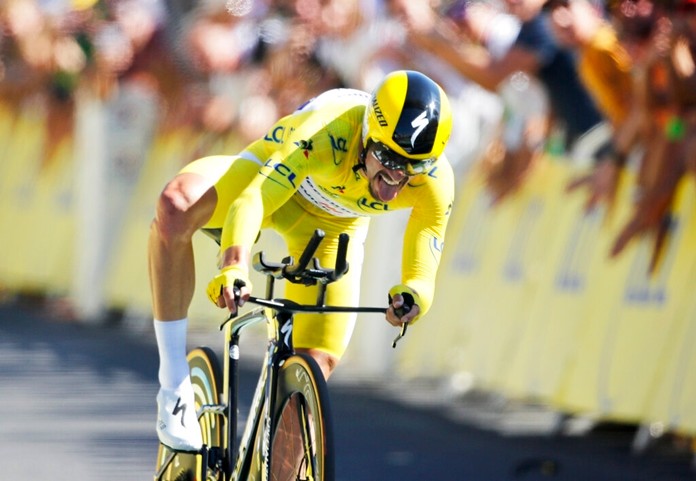
Pau, France (AP) — A question that first seemed pie-in-the-sky is growing in credibility with each additional ride that takes him toward Paris: Could Julian Alaphilippe carry the yellow jersey glued ever more firmly to his shoulders all the way to the Tour de France finish on the Champs-Elysees?
With the Tour’s toughest climbs looming from Saturday, Alaphilippe pretends not. But it’s becoming increasingly difficult to believe him. Having had no excuse to uncork champagne since it last had a Tour winner in 1985, France will soon need to start thinking about icing the bubbly if he keeps surprising everyone, even himself.
Inspired by his yellow jersey, Alaphilippe delivered the biggest shock so far in this Tour by holding off defending champion Geraint Thomas to win the only individual time-trial stage on Friday, extending his race lead and ratcheting up French hopes for a first homegrown champion since Bernard Hinault won his fifth title 34 years ago.
Roared on by crowds thunderously hammering on roadside barriers, and super-motivated on the 100th birthday of the iconic yellow shirt, Alaphilippe delivered a barnstorming performance on the tricky, hilly, turn-filled time-trial loop south of Pau, with spectacular views of the Pyrenees.
Having previously predicted that he’d lose time to Thomas, an expert in the race against the clock, Alaphilippe stunned even himself by emphatically relegating the Welshman into second place, 14 seconds slower — a surprising margin of victory in a discipline where riders train in wind tunnels and ride go-fast bikes in go-fast skinsuits to shave off time.
“It’s incredible,” Alaphilippe said, adding that his performance reduced members of his team to tears.
“I was transported by the maillot jaune.”
His second stage victory of this Tour — he also was victorious on Stage 3 — came 100 years to the day since the Tour first awarded a yellow jersey, to Frenchman Eugène Christophe on July 19, 1919. Stage 3 was also where Alaphilippe first took the race lead. He then lost it on Stage 6, got it back on Stage 8 and hasn’t let anyone else near it ever since.
But between Alaphilippe and Paris are two huge obstacles: The Pyreenees and the Alps, with a total of seven climbs to above 2,000 meters (6,500 feet) still to come in the highest Tour in the race’s 116-year history. The first of those monsters is the Tourmalet on Saturday. Alaphilippe’s sizeable lead of 1 minute, 26 seconds over Thomas could melt like the Pyrenees’ last snows in the July heat if he cracks on the long uphill finish and, next week, in the Alps.
“There’s a long way to go and a lot of hard stages to come now,” Thomas said.
But Thomas, too, was among those stunned by Alaphilippe’s sustained power on the 27-kilometer (17-mile) time-trial route, where he was quickest through all the checkpoints and then rode explosively up the final climb to grow his winning margin.
“I didn’t really expect that,” Thomas said. “He’s obviously going incredibly well, so he’s certainly the favorite and the one to watch.”
Mindful of how quickly the Tour’s mountains can destroy podium hopes, Alaphilppe furiously sought to temper expectations, repeating that he is thinking only “day by day.”
“One mustn’t dream,” Alaphilippe said.
Given the doping-stained history of cycling and the Tour, Alaphilippe also immediately faced a question in his winner’s news conference about the believability of his performance, which he batted away, seemingly unruffled.
“If it creates suspicions, that’s the way it is,” he said. “I’m just riding my bike in the way I like.”
Having continued to confound expectations with his punchy riding and gritty determination to stay in yellow, Alaphilippe is converting others in the peloton to the idea that he could ride up the Champs-Elysees in the lead on July 28.
“He can surprise everybody,” said Belgian rider Thomas De Gendt, third on Stage 13 and 36 seconds slower than Alaphilippe.
Behind Thomas and Alaphilippe, there was significant movement in the overall standings among other riders also fighting to get on the podium.
Steven Kruijswijk from the Netherlands, fifth in Paris last year, vaulted to third overall. But his deficit to Alaphilippe grew to 2:12, having been just 1:27 off the lead before the French rider’s time-trial tour de force.
Thomas’ teammate, Egan Bernal, slipped from third to fifth overall, now 2:52 behind Alaphilippe. Having started the Tour in Belgium as equal co-leader with Bernal on their team, Thomas looks increasingly like the undisputed No. 1 at Ineos.
The no-holds-barred performance from Alaphilippe rewarded him for taking risks on the course that proved too difficult for some other riders.
Belgian Wout van Aert, a Tour rookie who won Stage 10, plowed into a roadside barrier and crashed in a right-hand curve close to the finish. He’d been one of the quickest riders on the course before hitting the deck. Medics treated him at the side of the road and then transported him away by ambulance. His team, Jumbo-Visma, said van Aert was conscious but out of the Tour with a flesh wound on his right upper leg.
 |
 |
 |





